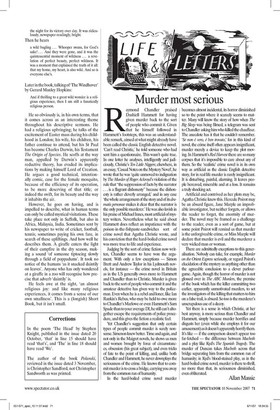Murder most serious
Raymond Chandler praised Dashiell Hammett for having given murder back to the sort of people who commit it. Given that he himself followed in Hammett's footsteps, this was an understandable remark, aimed at what might already have been called the classic English detective novel. 'Can't read Christie,' he told someone who had sent him a questionnaire This wasn't quite true. In one letter he analyses, intelligently and judiciously, Christie's Ten Little Niggers; elsewhere, in an essay, 'Casual Notes on the Mystery Novel', he wrote that he was 'quite unmoved to indignation by The Murder of Roger Ackroyd's violation of the rule that "the suppression of facts by the narrator ... is a flagrant dishonesty" because the dishonesty is rather cleverly arranged,' and in any case `the whole arrangement of the story and of its dramatis personae makes it clear that the narrator is the only possible murderer.' He was also lavish in his praise of Michael Innes, most artificial of mystery writers. Nevertheless what he said about Hammett does reflect an impatience with the poison-in-the-fishpaste-sandwiches sort of crime novel that Agatha Christie wrote, and his conviction that the hard-boiled crime novel was more true to life and experience.
Judging by the sort of crime fiction now written, Chandler seems to have won the argument With only a few exceptions — Simon Brett and Andrew Taylor in his Lydmouth novels, for instance — the crime novel in Britain as in the US generally owes more to Hammett and Chandler than to Christie. Murder is given back to the sort of people who commit it and the amateur detective has given way to the policeman. Even when he is a rebel and loner, like Ian Rankin's Rebus, who may be held to owe more to Chandler's Marlowe or even Hammett's Sam Spade than to your average DI, he still can't altogether escape the requirements of police procedure, and this gives the fiction a realistic feel.
Yet Chandlers suggestion that only certain types of people commit murder is surely nonsense. Simenon knew better. Time and again, and not only in the Maigret novels, he shows us men and women brought by force of circumstances, obsession (his great subject), and even tricks of fate to the point of killing, and, unlike both Chandler and Hammett, he never downplays the seriousness of the crime. He knows that to commit murder is to cross a bridge, canying you away from the common run of humanity.
In the hard-boiled crime novel murder becomes almost incidental, its horror diminished so to the point where it scarcely seems to matter. Many will know the story of how when The Big Sleep was being filmed, a telegram was sent to Chandler asking him who killed the chauffeur. The anecdote has it that he couldn't remember. 'Se non e vero, e ben irovato; for in this kind of novel, the crime itself often appears insignificant, murder merely a device to keep the plot moving. In Hammett's Red Harvest there are so many corpses that it's impossible to care about any of them. So the 'realistic' crime novel is in its own way as artificial as the classic English detective story, for in real life murder is rarely insignificant. It is disturbing, painful, alarming. It leaves people bereaved, miserable and at a loss. It remains a truly shocking act Artificial and contrived as her plots may be, Agatha Christie knew this. Hercule Poirot may be an absurd figure, Jane Marple an improbable investigator, but neither forgets, or allows the reader to forget, the enormity of murder. The novel may be framed as a challenge to the reader, even as a sort of game, but at some point Poirot will remind us that murder is the unforgiveable crime, or Miss Marple will declare that murder is evil and the murderer a very wicked man or woman.
There are admittedly exceptions to this generalisation. Nobody can take, for example, Murder on the Orient Express seriously, or regard Poirot's elucidation of the mystery as anything other than the agreeable conclusion to a clever parlourgame Again, though the horror of murder is not glossed over in The ABC Murders, the premise of the book which has the killer committing two earlier, apparently unmotivated murders, to set the investigators of the killing that matters to him on a false trail, is absurd. So too is the murderers unscrupulous use of a decoy.
Yet there is a sense in which Christie, at her best anyway, is more serious than Chandler and Hammett, simply because murder hon-ifies and disgusts her (even while she employs it for our amusement) as it doesn't apparently hon-ify them. It's like — if the comparison doesn't appear too far-fetched — the difference between Macbeth and a play like Kyd's The Spanish Tragedy. The murder of Duncan takes Macbeth across that bridge separating him from the common run of humanity; in Kyd's blood-stained play, as in the hard-boiled crime novel, murder is there to thrill, no more than that, its seriousness diminished, even obliterated.
Allan Massie





































































 Previous page
Previous page